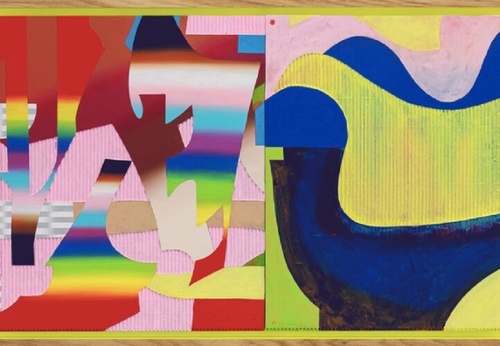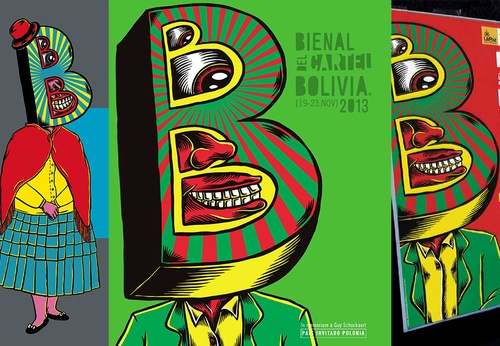
Regional talent conquers spaces with contemporary art
Juan Luis Landaeta explores creative and innovative processes in the artistic world
EL UNIVERSAL
Juan Luis Landaeta, born in Maracay, Aragua state, in 1988, has established himself as a multidisciplinary artist whose work explores creative and innovative processes both within and outside the conventional artistic sphere. His academic training includes a Master's degree in Creative Writing in Spanish from New York University, an achievement that complements his visual practice and has allowed him to develop a distinctive artistic voice.
Landaeta is the author of The Well-known Inheritance of Forms and Litoral central, two works that demonstrate his interest in narrative and literary experimentation. His solo exhibitions have been acclaimed in the United States, including "Jardín Desierto" in Brooklyn in 2017, "The Identity of the Line" at the Inter-American Development Bank in 2019, and "Unwritten" at the Mehari Sequar Gallery, also in 2019.
Contemporary and Urgent
At the Inter-American Development Bank (IDB) Staff Gallery in Washington, D.C., Landaeta is currently presenting "Doxa," his most recent exhibition. This exhibition consists of 12 acrylic paintings that address contemporary and urgent themes such as migration, confinement, and violence.
In "Doxa," Landaeta continues to develop his distinctive visual language with a powerful and authentic discourse. The exhibition brings together his most recent acrylic painting work, created between 2022 and 2025. It represents his fifth solo exhibition in the United States, in addition to three group presentations, consolidating his career and establishing him as a prominent Latinx voice in American art.
Landaeta expresses his gratitude and pride as a Venezuelan and immigrant for having the opportunity to present his work in one of the most relevant spaces for contemporary Latin American art in Washington. With "Doxa," he delves into his visual language, addressing complex themes such as the sense of belonging.
The title "Doxa," which means "opinion" in Greek, suggests an exploration of the tensions between the intuitive and the calculated, the lyrical and the chaotic. Landaeta interweaves a reflection on the sense of belonging with discourses of violence and hate, inviting the viewer to consider multiple perspectives and question established truths.
Source

- January 28, 2026
Globalization and New Discourses in Contemporary Latin American Art

- January 28, 2026
Contemporary Art in Latin America

- January 27, 2026
Aztecs in the Empire City: “The People Without History” in The Met


- January 27, 2026
The Evolution of Art: From Classical to Digital

- January 27, 2026
What are Visual Arts and Why Do They Matter Today?

- January 27, 2026
Selected Illustration Gallery of Venezuelan Artists

- January 27, 2026
Selected Caricature Gallery of Cuban Artists

- January 26, 2026
Bolivia Poster Biennial (BICeBé 2013)

- January 27, 2026
The exhibitions "From Tàpies to Siqueir…

- January 19, 2026
The Pulse of Art, Design, and Culture R…

- January 19, 2026
The Argentine museum celebrates 25 year…

- January 08, 2026
Latin American Pavilion Among the New A…

- January 07, 2026
Material Art Fair 2026

- January 05, 2026
The Latin American Pavilion Marks a Mil…

- December 31, 2025
the 10 million-dollar sales of 2025

- December 30, 2025
MALBA Doubles Collection and Reposition…

- December 29, 2025
The FEMSA Collection will celebrate its…

- December 25, 2025
“Ancestral Artist”: A Look at the Craft…

- December 25, 2025
Winner of the 13th Most Important Conte…

- December 25, 2025
Malba Acquires the Daros Latinamerica C…

- December 24, 2025
2026, a Key Year in Cultural Exchange B…

- December 23, 2025
Sacred Art Celebrates Christmas Through…

- December 22, 2025
MACA Inaugurates Exhibitions of Fontana…

- December 20, 2025
Costantini Acquires the Daros Collectio…

- December 17, 2025
ARCOmadrid Announces Participating Gall…

- December 17, 2025
Eduardo Costantini Acquired a Collectio…

- December 15, 2025
From Chile to Gaza: «Palestine Cries,»

- December 15, 2025
Latin American Artists MACLA and Montal…

- October 08, 2023
Illustrations reflect the brutal Israel…

- December 25, 2023
The jury statement of the Iran-Brazil F…

- March 21, 2024
The history of art in Palestine

- July 29, 2023
History of Caricature in Brazil

- September 01, 2023
Neural Filters in new photoshop 2023

- April 20, 2024
Poignant Image of Grief Wins Mohammed S…

- May 22, 2025
Brady Izquierdo’s Personal Exhibition O…

- June 29, 2024
Exhibition at Centro MariAntonia contra…

- October 21, 2023
Erick Meyenberg and Tania Ragasol at th…

- February 18, 2024
7 Ways to Understand What Visual Arts A…

- May 15, 2024
Eleven murals for Gaza painted across t…

- March 30, 2024
illustration websites in Latin America

- August 09, 2023
Venezuela mural expresses solidarity wi…

- March 14, 2024
museum of statue of van gogh

- May 25, 2025
Bordalo II to hold exhibition in Paris …

- March 15, 2024
museum of sculpture of Salvador Dali

- May 20, 2024
Latin American Festival of Performing A…

- January 23, 2025
Art Palm Beach 2025

- March 18, 2025
Works by Cuban Artist Eduardo Abela in …

- January 04, 2025
Material Art Fair 2025

- May 15, 2024
Eleven murals for Gaza painted across t…

- February 18, 2024
7 Ways to Understand What Visual Arts A…

- January 02, 2025
13 commemorations that will mark the cu…

- October 17, 2023
The influence of Latin American artists…

- February 03, 2024
THE HISTORY OF NAIF ART

- July 02, 2024
One of the largest urban art galleries …

- November 17, 2023
Fernando Botero's work is booming after…

- October 08, 2023
Illustrations reflect the brutal Israel…

- July 29, 2023
Piracicaba International Humor Exhibiti…

- December 25, 2023
The jury statement of the Iran-Brazil F…

- November 06, 2023
Heba Zagout: Palestinian artist murdere…

- December 10, 2023
Sliman Mansour and Palestinian art on t…

- March 14, 2024
museum of statue of van gogh

- February 01, 2025
A maior exposição de Botero em Barcelona

- March 21, 2024
The history of art in Palestine

- July 20, 2024
First International Mail Art Biennial 2…

- April 20, 2024
Poignant Image of Grief Wins Mohammed S…

- October 30, 2023
Palestinian turns images of the Gaza co…

- September 01, 2023
Neural Filters in new photoshop 2023

- February 08, 2024


